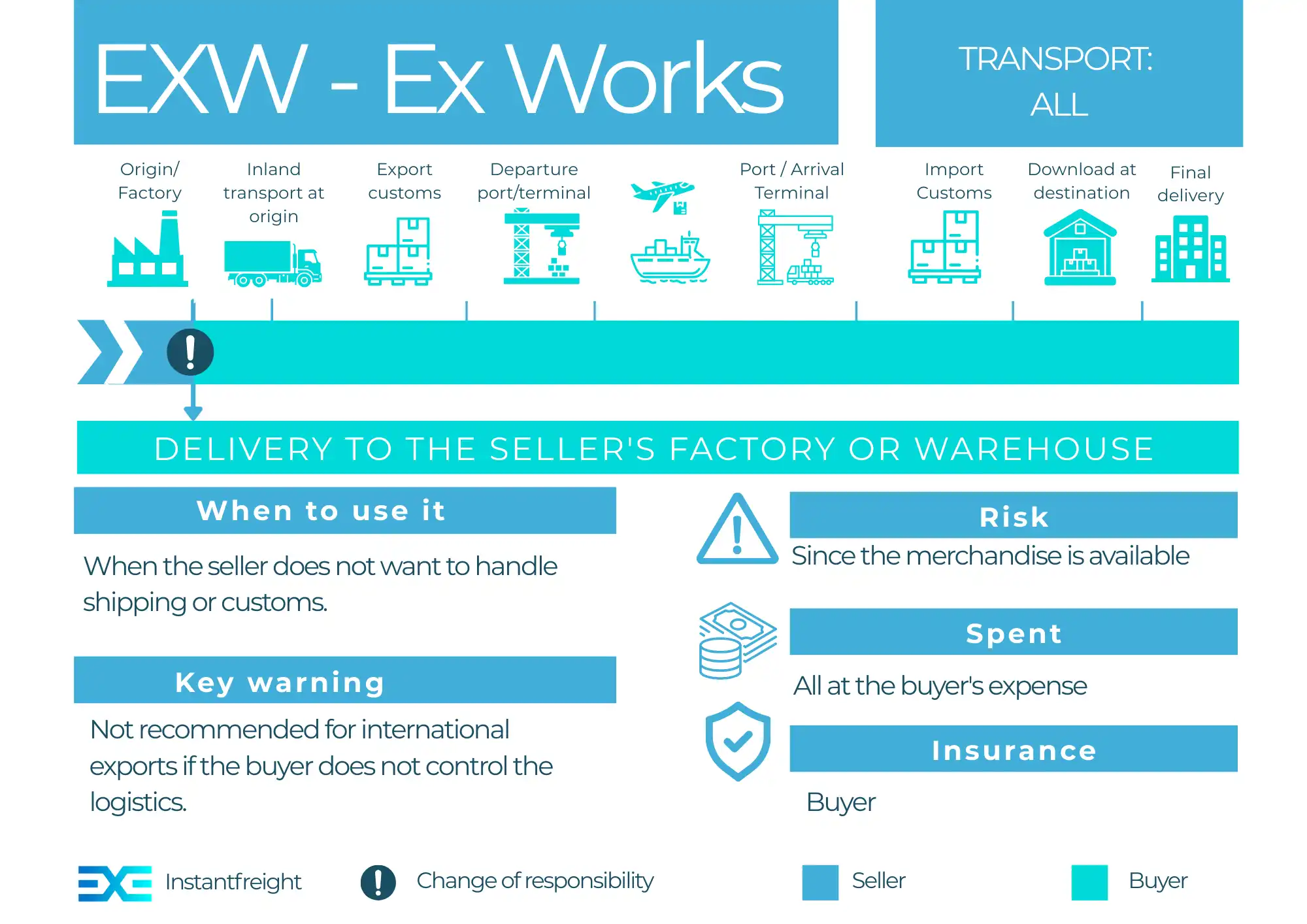Incoterm EXW (Ex Works): Maximum responsibility for the buyer
EXW (Ex Works) is the Incoterm® that establishes the least obligation for the seller and the maximum for the buyer. If you have agreed to this term with your supplier, it is crucial that you understand all the responsibilities and costs you assume when this term is chosen for the purchase and transport.
GET A RATE FOR YOUR SHIPMENT IN SECONDS
What does EXW mean?
Under Incoterm EXW, the seller fulfils their obligation to deliver at the moment they make the goods available to the buyer at their own premises (factory, warehouse, workshop, etc.).
From that moment, maximum responsibility and all costs and risks pass to the buyer.
Your Responsibility as buyer includes:
Loading of goods
Organising and paying for the loading of the goods onto the transport vehicle at the seller's warehouse.
Inland transport at origin
Contracting and paying for transport from the seller's warehouse to the port or airport.
Export customs clearance
Managing and paying for all customs formalities and costs for exporting the goods.
Main carriage
Contracting and paying for sea, air, or land freight.
Goods insurance
Contracting insurance to cover the transport.
Import customs clearance
Managing and paying for all formalities and duties at destination.
Inland transport at destination
Contracting and paying for transport from the arrival port/airport to your warehouse.
Seller's Responsibility (Minimum):
Making the goods available to you at the agreed place.
Packaging and packing the goods for transport.
Notifying that the goods are ready for collection.
Practical Example:
You buy machinery from a supplier in Valencia under Incoterm EXW.
- 1.The supplier notifies you that the machine is ready at their factory in Valencia.
- 2.As the buyer, you must send a truck to their factory to collect it.
- 3.Your carrier loads the goods onto the truck.
- 4.From that moment, the risk is yours. If the goods are damaged during loading or transport to the port, you are responsible.
- 5.You manage the transport to the port of Barcelona, export customs clearance, and sea freight, assuming all costs.
When is it advisable to use EXW?
This Incoterm is ideal in the following cases:
You are the buyer and have great control over your logistics
If you have a trusted freight forwarder in the country of origin who can manage all export formalities, transport, and customs.
Transactions between companies of the same group
When the buying and selling company are subsidiaries and have centralised logistical control.
When the seller does not have an export license
This is common in emerging markets or with small suppliers.
Caution!
Often, sellers do not have the resources or knowledge to manage exports. If you do not have an agent in the country of origin, avoid using EXW. An error in customs clearance can detain your cargo indefinitely, with the cost implications this may entail.
Other Incoterms
Free Carrier
The seller delivers the goods to the carrier designated by the buyer.
Carriage Paid To
The seller pays for transport to the agreed destination.
Carriage and Insurance Paid To
The seller pays for transport and insurance to the agreed destination.
Delivered at Place Unloaded
The seller assumes all costs and risks until the goods are delivered and unloaded at the agreed destination (e.g., a terminal or warehouse).
Delivered At Place
The seller delivers when the goods are made available at the agreed place.
Delivered Duty Paid
The seller assumes all costs and risks until final delivery.
Free Alongside Ship
The seller delivers the goods to the carrier designated by the buyer.
Free On Board
The seller delivers when the goods pass the ship's rail.
Cost and Freight
The seller pays the cost and freight to the destination port.
Cost, Insurance and Freight
The seller pays the cost, insurance and freight to the destination port.

